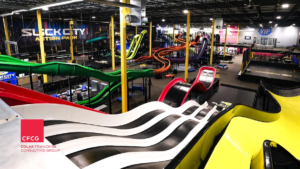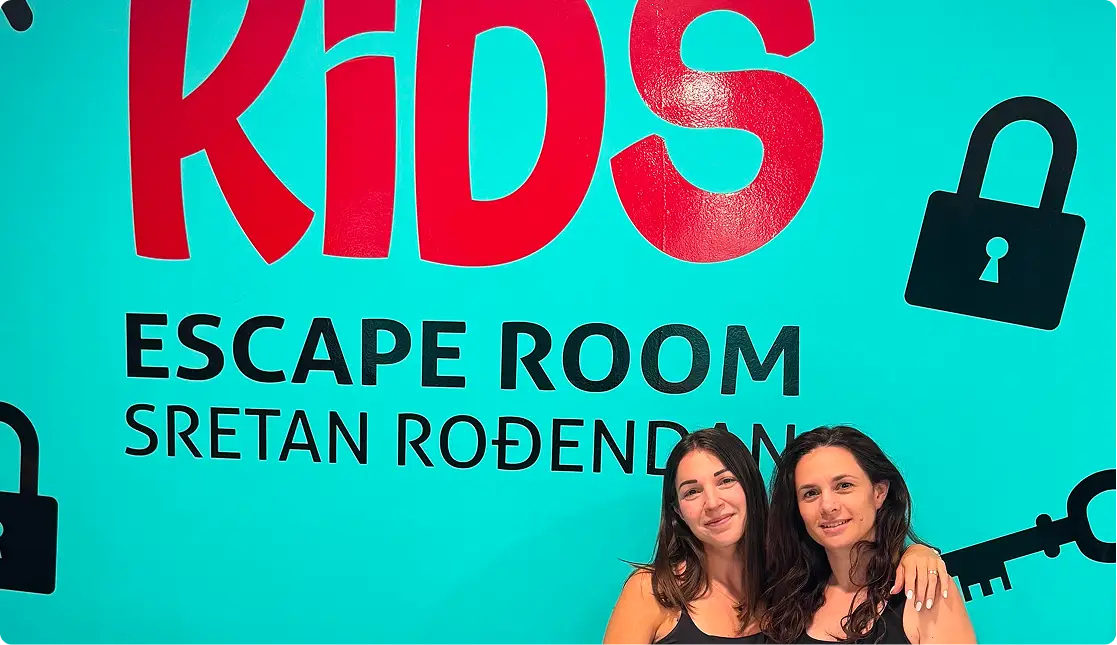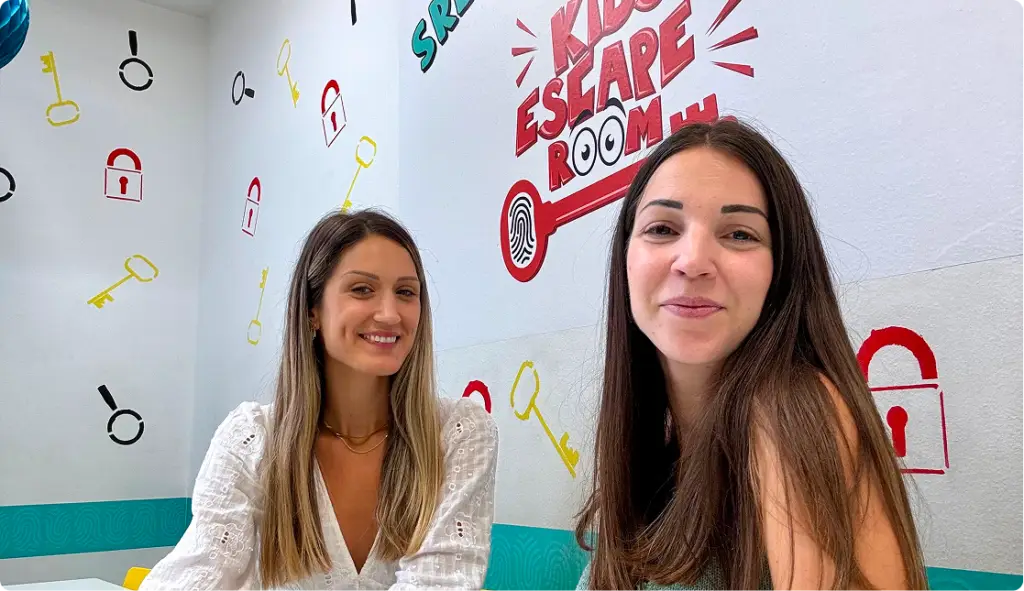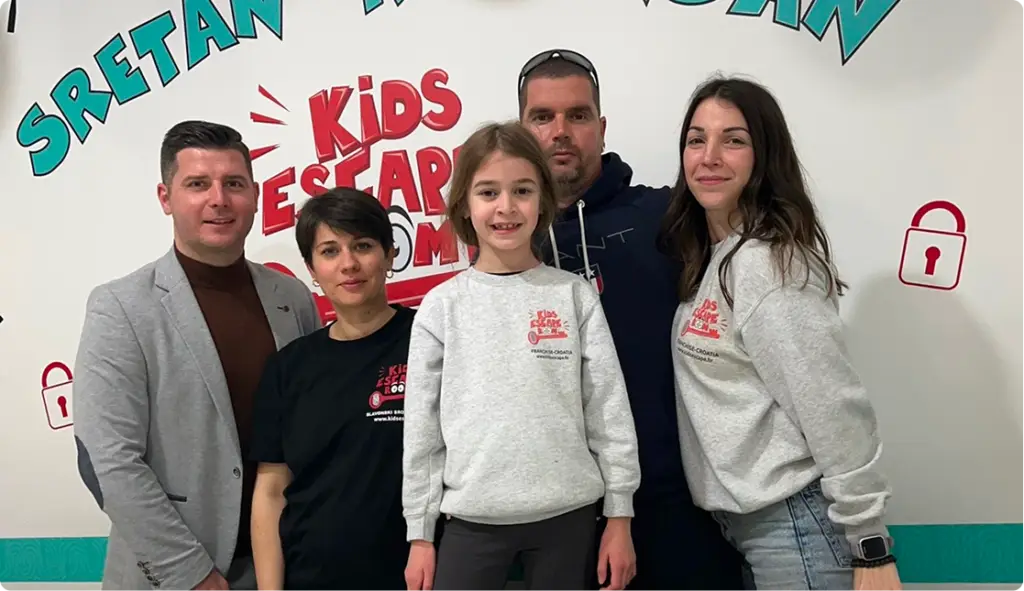
How One Idea Turned into Seventeen Locations — The Story of KiDS Escape Room

When Nikolina, the founder of KiDS Escape Room, first reached out to us, she had one location — a small, vibrant playroom where children solved puzzles, learned through play, and left with that spark in their eyes. But she had a bigger vision. She believed her concept could live far beyond that one city — and she was right.
Together, we built the foundation for growth: a clear franchise model, structured documentation, and a system that could deliver the same magical experience anywhere. Within just a few years, KiDS Escape Room grew from one location to seventeen, expanding across four countries and inspiring hundreds of children every day.
This conversation with Nikolina isn’t just about her success — it’s about what happens when creativity meets structure. It’s about turning a great idea into a scalable business, about trusting the process, and about building something that can outgrow you.
At CFCG, we specialize in helping entrepreneurs do exactly that — take what works, and make it replicable.
If you’re wondering whether your brand is ready to become a franchise success story, we’d love to explore that together.
Reach out for a free consultation at [email protected].

Interview
1. When and how did the KiDS Escape Room concept originate?
The KiDS Escape Room concept was created in 2019 from a desire to offer school-age children, between 7 and 12 years old, a completely new type of entertainment that combines play, exploration, and learning. I wanted to create a space where children could, through experience, teamwork, and curiosity, solve tasks that develop their logic, imagination, and self-confidence.
2. When did you decide to start franchising, and what motivated you to take that step?
I made the decision to start franchising in 2022. What motivated me was the realization that I had something truly unique — a concept that both children and parents immediately recognized as something special. People from other cities, as well as tourists who were thrilled by our experience, often contacted me asking if something similar existed in their area. I realized there was enormous potential and a strong desire to expand this type of entertainment — and that’s how the idea of franchising was born, as a natural next step in our development.
3. How many franchises were sold in the first year, and how many are there today?
In the first year, we sold three franchises, and today we have seventeen locations. That result speaks for itself — in just a few short years of growth, we have become a network that offers children in several countries a unique adventure through play and learning.
4. How did the number of franchisees grow over the years, and what were the key moments in that development?
The growth was steady and consistent. After the first year with three franchises, the number of partners increased year by year — thanks to a strategy that was clear from the beginning: focusing on key cities and choosing the right partners.
The key moment came when we sold the first franchises — that moment of trust from partners in a franchise that didn’t yet exist (beyond the first location) created momentum. After that, interest began to grow organically, without the need for aggressive marketing. People recognized the concept and wanted to be part of the story.
5. What do you consider the most important factor in selling franchises — what had the greatest impact on success?
I believe the most important thing is to have an authentic, proven concept that people instinctively recognize as something good. Of course, marketing and networking are important, but in my case, success came from the uniqueness of the idea itself. I never felt like I was “selling” something to anyone — people reached out on their own because they wanted to be part of this concept.
6. How do you keep franchisees satisfied and motivated throughout the collaboration?
The greatest motivation for my franchisees comes from their results — successful operations and profitable locations. When I see that their work is paying off, it motivates both them and me.
In addition, I’m passionate about personal development and business mindset, and I share that knowledge with them. We communicate regularly, exchanging experiences and ideas. My role is not just a business one — I strive to be a source of support, inspiration, and a partner who encourages them to grow and achieve excellence.
7. Have you faced any challenges in working with franchisees, and how did you resolve them?
Of course — every business comes with its challenges. I don’t see them negatively, but rather as lessons that help the concept grow. Every challenge is an opportunity to learn something new, look at things from a different perspective, and improve the system.
I resolved them in the most human way possible — through conversation, understanding, and trust. KiDS Escape Room is not a corporation — we are a network of people who share the same passion. I have a personal relationship with each franchisee, striving to understand their circumstances and find solutions together. That approach has always paid off.
8. When you look back — are you satisfied with your decision to start franchising?
Absolutely yes. It’s a decision that changed the course of my business and created tremendous momentum. From a single playroom, we have grown to seventeen locations across four countries. What matters most to me is that this growth was driven by a unique concept that gives children across the region unforgettable adventures and memories.
9. Which channels have been the most effective for selling franchises?
The most successful channels were social media and online advertising. The internet played a key role in spreading information about the concept. In addition, many partners found me through franchise portals and articles about the brand.
10. What’s important to you when selecting and qualifying franchisees? How do you know someone is the right partner?
In our network, the most important thing to me is having the right people on the other side — those who share the same values, energy, and enthusiasm for what we do. When selecting franchisees, I look at several factors: business experience, team management skills, or previous work in the entertainment and education sector — for example, as an educator, teacher, or activity leader for children. However, that’s not decisive. I’ve also met partners who had no prior business or industry experience but possessed great passion, ambition, and belief in the project — and they often turned out to be the most successful ones.
For me, the ideal franchisee is someone who understands that buying a franchise doesn’t mean buying success, but rather acquiring the tools and system to build it themselves. It’s someone who is proactive, determined, unafraid of change, and ready to take responsibility for their results. When someone has that mindset and a genuine desire to create — that’s when I know they’re the right partner for our network.
11. How do you choose the markets you want to expand into?
I would say that markets often choose me. Our concept is universal — it can work in any country because children everywhere love to explore, play, and learn through fun. We have a clear strategic development plan that currently focuses on Europe and the GCC region, where I see great potential.
In particular, countries in the GCC region are currently experiencing strong growth and investment in the entertainment and edutainment industries, and our concept fits perfectly into that vision. Still, most of our expansion happens naturally — partners from different countries reach out to me because they recognize that the KiDS Escape Room concept can successfully operate anywhere.
12. Approximately how many franchise inquiries do you receive, and how many of them turn into actual partnerships?
Every time we launch an advertising campaign, the number of inquiries is very high, but through our filtering system, we quickly identify the right candidates. We use a franchise application that helps us assess the experience, motivation, finances, and expectations of potential partners.
Thanks to this process, we can easily recognize the people who are a good fit for our concept — and almost always, those candidates end up becoming our new franchisees. The process from initial contact to partnership is usually quick and very natural, as there’s mutual recognition of shared values and goals.
13. How much did the franchise documentation and structure we developed together help you throughout the entire process?
The structure and documentation I developed with CFCG were key to professionalizing the entire process. They provided me with clear steps — what to do when a potential partner reaches out, which stages we go through, what materials to send, and how to guide the process up to signing the agreement.
This system gave me confidence and consistency in my work, while also saving a lot of time. Time and again, it has proven how important it is to have high-quality franchise agreements and clear procedures. I truly believe that without this structure, the franchise could not have grown at the pace it has.
14. What are your future plans for the brand in terms of further franchising?
We are already present in all major cities in Croatia, and the plan is to continue expanding into European markets and enter the GCC region. Our focus is now shifting toward international growth, as I believe that KiDS Escape Room has the potential to become a globally recognized brand in the children’s entertainment and edutainment segment.
15. Would you recommend that others start developing a franchise for their brand?
Of course — but with one important “if.” If they’re ready for a lot of work, dedication, and a shift in perspective. Franchising is a demanding process. It’s important to understand that running a franchise is not the same as running your own business — it’s an entirely new role. The owner must be ready to take responsibility for the system, the partners, and maintaining standards.
At the same time, it’s the most rewarding form of partnership you can have — because your franchisees’ success becomes your success too. In this way, with relatively small investments, you can scale your brand and build a network that brings your idea to life across different markets.
16. What was your biggest challenge at the beginning of franchising — and how did you manage to overcome it?
My biggest challenge was finding my new role in all of it. Suddenly, I was no longer just the owner of one playroom, but someone others relied on — someone who needed to have the answers, the system, and the vision. At first, that was a challenge, but also an incredible opportunity for personal growth.
I learned to recognize that my job was no longer just managing a space and a team, but leading a network and supporting the people who chose to believe in my brand. That shift in perspective enriched me greatly and truly shaped me as a leader.
17. Was there a moment when you realized that your franchise had truly “come to life” — that it had become something bigger than the original idea?
Yes — that moment came when I realized I no longer needed to advertise the franchise for people to reach out. People from different countries began contacting me on their own, sending messages and emails expressing interest. That’s when I understood that the concept had a life of its own — that the story was spreading by itself and that the brand had built a reputation beyond borders. Although I believed in success from the very beginning, that moment when you see your idea grow beyond you personally — that’s a truly special feeling.
18. What personally motivates you the most when working with franchisees?
What motivates me the most is the process itself — creating, growing, and evolving. I love working, I love innovation, and I enjoy the creativity that this job brings. But what brings me the greatest joy are my partners — their successes and the fact that today, in 17 cities, I have not only collaborators but also friends.
Their progress, results, and satisfaction are the greatest confirmation that everything we do truly has meaning.
19. If you were starting from scratch today — what would you do differently in the process of developing your franchise?
I wouldn’t do anything differently. I believe the system was set up correctly from the very beginning — from the legal and administrative foundations, such as trademark protection, brand identity, contracts, and documentation, to the creative aspects of the concept and execution. Everything was carefully designed and structured to grow and expand smoothly. This became most evident during the process of opening new locations, where we could see at every step how well the system worked in practice. So, I wouldn’t change a single thing.
20. What would you say to entrepreneurs who are afraid they’ll lose control of their brand if they start franchising?
That’s the most common fear, and it’s completely understandable. But franchising isn’t about losing control — on the contrary, it’s a way to maintain it through systems and standards. The key is to set everything clearly from the start: rules, processes, communication, and support. When that’s done well, partners don’t “take away” the brand — they multiply it. For me personally, it was important to build a relationship of trust, where partners know that I’m always there for them, while still giving them the freedom to be themselves within the framework of the system.
21. How do you balance between standardization and creativity — do you allow franchisees to make adaptations?
I believe in balance. Standards are the foundation, as they ensure consistency and brand recognition. But at the same time, each location has its own local spirit, audience, and way of interacting with children. That’s why I allow creative adaptations — but always within the framework of what makes KiDS Escape Room special. I encourage partners to be creative, propose new ideas, and participate in the concept’s development.
22. Do you have an anecdote or experience from your relationship with franchisees that could serve as a lesson for others?
I would highlight an experience that taught me a lot. In the beginning, I wanted to help everyone with everything — sometimes even more than was necessary. I realized that true support isn’t about solving things for them, but about setting boundaries and teaching them how to find solutions on their own. This changed the dynamic of our relationship — partners became more independent, and it also freed me to focus on developing the brand.
23. What has been your greatest confirmation of success so far — the moment when you thought, “it was all worth it”?
The greatest confirmation of success came when partners and investors from abroad began reaching out to me — completely spontaneously, without campaigns, purely based on recommendations and the impression of the brand.
That’s when I knew we had created something of real value, something that could become globally recognized.
24. How do you see the development of the escape room entertainment market in the next 5 years and where do you see Kids Escape Room in that story?
The escape room industry is developing rapidly, and the trend is moving increasingly towards a combination of entertainment and education. Parents are looking for content that is not just a game, but also an experience that encourages thinking and cooperation. Kids Escape Room fits perfectly into this space—as it offers a concept that connects play, logic, creativity, and education. Over the next five years, I see our brand as a leader in this segment, with branches in different parts of the world, where thousands of children will be able to experience our adventures and learn through fun.
25. In your opinion, how important is the emotional connection with the brand for a franchisee—and can this be learned or must it come naturally?
Emotional connection is crucial. When someone truly believes in what they do and lives the brand, it shows in everything—in communication, in approach to clients, in team motivation, and in results.
This can be partially taught, and an entire module of our education is dedicated to exactly this, but most of it is learned through example and experience, although genuine passion must come from within. I always sense this when talking to potential partners—who wants a business, and who wants to create an experience and a change.
26. How do you manage to maintain consistency of the experience across different franchise locations and cities?
Consistency is the result of the system, but also of constant communication and regular location visits. We have clearly defined standards, manuals, checklists, training, and support, and every minute of every program is predetermined and scheduled. This type of system actually simplifies daily operations for partners and their teams, and my regular supervision keeps everything under control.
27. How do you see the role of women in franchising—and do you think your example can motivate other female entrepreneurs?
I believe it can. Women often have an exceptional ability to connect, understand people, and manage details—all qualities that are important in franchising.
Personally, I am glad that I can be an example that a successful international brand can be built with passion, courage, vision, and consistency. I hope my story will encourage other women to dare, believe in their ideas, and take the lead—because franchising is an opportunity to multiply your own story and make it something much bigger.


